- Home
- Bobby Akart
36 Hours: A Post-Apocalyptic EMP Survival Fiction Series Page 3
36 Hours: A Post-Apocalyptic EMP Survival Fiction Series Read online
Page 3
As he finished, Stark set the chalk in the tray and pointed to the blackboard—Solar Sleuths. “For the first four weeks of this semester, we’ve covered the basics of astronomy and the physics of the universe,” said Stark. Then he channeled his sci-fi hero and continued, “Adventure, excitement, a Jedi craves not these things.”
The class laughed as one of the guys recognized the quote and chimed in, “But, Master Yoda, it is the lightsaber which excites me most!”
Stark continued to play along. “Young Jedis, you must unlearn what you have learned.”
“Yeah!” shouted one.
“Alright!” added another.
“Okay, calm down, y’all.” Stark moved to restore order. “I didn’t mean that literally. The universe is vast. We needed to get an overview under your belt before we start to talk about specifics. Today, young skulls full of mush, I will turn you into Jedi Solar Sleuths.”
This piqued Alex’s interest and she sat up in her seat. Stark wrote the word SUN on the board and circled it several times.
Alex was puzzled. Their homework assignment had nothing to do with the sun.
“It all begins here,” he started. “Without the sun, there is no life on earth. Without the sun’s heat and light, the earth would be a lifeless, enormous ice ball. The sun’s energy warms our seas, stirs our atmosphere, generates our weather patterns, and provides the photosynthesis to grow green plant life, which is vital to produce oxygen and food on our planet.”
Alex agreed. Naturally, it was fun to speculate on the topic of are we alone? One of the first books she read was Contact by Carl Sagan. She lay in bed at night, imagining herself as Ellie, and Jodie Foster, who played the character in the movie. Her imagination would wander to the massive power the sun held, and what would happen if it burned out. The risk of not using sunscreen was minor in comparison to the sun suddenly going dark.
Her mind drifted until Stark brought her back into the classroom with a question. “Alex, what causes an aurora?”
She sat up in her chair and replied, “An aurora is also called the northern lights. Sometimes the sun shoots out particles of energy that collide with our upper atmosphere. The result is a beautiful mix of colors near the earth’s poles.”
“Good start,” he said. “Auroras are produced when the earth’s magnetosphere is disturbed by the solar winds filled with highly charged electrons and protons.”
A hand shot up from the back of the room. “Mr. Stark, why don’t we see the aurora borealis where we live?”
“Good question,” he replied. “Who would like to take a stab at that one?”
No one immediately answered, so Alex raised her hand.
“Okay, Alex,” he said. “Obviously you’re ready to be a solar sleuth. Why don’t we see the aurora here?”
“For the aurora to extend this far south, the solar flare causing it would have to be very strong,” she replied. “It could happen, but I don’t think it’s occurred in recent history.”
“Very good, and you’re right,” praised Stark. “It hasn’t happened since we’ve been around, but it has happened before.” He turned to the blackboard and wrote 1859, then circled it.
“In 1859, the great geomagnetic storm, as they called it, hit the earth. There weren’t sophisticated instruments to record the magnitude of the solar flare that enveloped our northern hemisphere, but the auroras were so widespread and extraordinarily bright that they were seen as far south as Cuba and Hawaii.”
“So there is hope for us, right?” asked one of the students.
“Actually, let’s not hope for a repeat of the Carrington Event, as it’s now called,” replied Stark. “There were no electronics in 1859, but the telegraph operators certainly experienced the power of the sun. From coast to coast, telegraph wires exploded in sparks and the operators received electric shocks.”
Alex raised her hand after contemplating the enormity of what Stark just said. “What would happen if a solar flare like that hit our planet today?”
Stark placed his hands in his pockets and walked through the classroom with his head down. He paused to look through the classroom’s windows at the extraordinarily warm September day.
“If such a powerful burst were to hit the earth today, the energy could zap satellites, fry computer systems, and knock out our power grids. We would be welcomed back to the nineteenth century.”
Chapter 4
35 Hours
Noon, September 7
Ryman Residence
Belle Meade, Tennessee
“Mom, I’m comin’ to Siesta Key where it’s nice and cool,” said Madison Ryman as she wiped the sweat from her forehead. With the cordless phone propped against her shoulder, she turned on the television, and the graphic underneath the image of Meteorologist Davis Nolan at WKRN said it all—RECORD HEAT. She read the closed-captioning while her mother spoke into the phone. One hundred five degrees … ties a record set in 1954 … no end in sight.
“Of course we will, Mom. I miss you too. Love you.” Madison exhaled and glanced into the backyard at the rippling, crystal clear water in the pool. No time today. She started separating the bags of supplies picked up from Party City. The informal get-together Friday night was intended to celebrate Colton’s Super Bowl success and would be attended by a couple of dozen friends, neighbors, and business associates. Bobby Bones, a longtime family friend and one of the top on-air talents at WSIX, would be there. He would provide a never-ending supply of humor.
Bones introduced Colton to Madison sixteen years ago during a music video shoot on Second Avenue. At the time, Madison was a graduate student at Lipscomb University, studying film and creative media. Before her dad passed away, he convinced her that being a debutante wouldn’t pay the bills. Once the cotillions were over, it was time to get serious about her future. Lipscomb University provided her an outstanding, faith-based local university that was well respected in her chosen field—digital entertainment.
She loved producing videos. At the age of sixteen, she produced an indie film titled Diary of a Deb, which gained her an Independent Spirit Award nomination. She was proud of her efforts and entered college with the goal of becoming a filmmaker.
During the music video shoot, she snuck away to have lunch with Colton, and they began dating. He was everything she sought in a man, besides his incredible good looks. He was caring and compassionate. He was always honest with her. Above all, he made her laugh.
They were married in a modest ceremony at First Baptist Church in downtown Nashville and immediately started a family. Colton’s career at United Talent was taking off, and she tried to continue her job as a creative director for Ruckus Films. For a while, Madison’s mother helped out with Alex, but after her mom moved to Siesta Key, Madison focused her life on the things that mattered most—Colton and Alex. She never regretted that decision.
Madison focused on raising their adorable daughter and providing the logistical support, as she liked to call it, for Colton’s social engagements. His position at United Talent required entertaining and social gatherings. At least once a month, Madison was organizing a get-together in their Belle Meade home.
Friday night, the center of attention would be on Colton rather than his more famous clients for a change. Her iPhone vibrated on the counter. It was a text from Colton.
C: Miss you!
She smiled as she responded.
M: Miss you more! Call after the concert tonight. Love!
That was all it took—a simple text to remind Madison of how much he missed her. She knew how busy Colton was, especially today, the biggest day of his career. Yet Colton was thinking of her.
The landscape service arrived and began their work. Despite the incredible heat, the primarily Hispanic crew got right to it, and the sounds of mowers could be heard immediately. It was just another day.
Chapter 5
32 Hours
3:00 p.m., September 7
Davidson Academy
Nashville, Tennesse
e
Madison wheeled the Chevy Suburban toward the circle drive in front of Davidson Academy and patiently waited as other parents picked up their kids. Alex had a golf match that afternoon, and she needed a change of clothes and her clubs. There were plenty of other schools closer to their home in Belle Meade, but Madison was willing to sacrifice her time for the sake of the best college preparatory education Alex could receive.
She turned on her SiriusXM radio to channel 161, which had resumed the simulcast of WSIX in Nashville. After a moment, she opted for the news instead and found Shepherd Smith on Fox.
“Aurora watchers will be pleased over the next few nights as our sun heats up,” said Smith. “With record heat waves across the country, the last thing we need is a fired-up sun, right, Janice Dean?”
“That’s right, Shep,” said Dean, the Fox News meteorologist. “As you know, I was born in Toronto, Canada, and started my career in Ottawa. Seeing the northern lights was not out of the ordinary for us. In Canada, we would forecast the weather here on earth, but we would also provide our viewers a space weather forecast based upon solar activity. I bet you didn’t realize I wore so many hats, did you?”
“I did not,” replied Smith. “Folks, this is why they call her Janice Dean the Weather Queen.”
“And don’t you forget it, Shep. From what I’ve seen, this solar event should create some incredible light displays along our northern border states and well into Maine. That’s pretty rare, Shep, and is an indicator of the potential strength of the solar flares emanating from the sun right now.”
“Thank you, Janice. Keep us posted. In any event, not to worry, folks. The Canadians will get the pretty light show and we’ll get more blistering heat. Same old, same old.”
Alex tapped on the window. Madison was lost in thought and didn’t realize her daughter was there, causing her to jump a little. She fumbled for the lock switch and relocked the doors before finally unlocking them.
“Hey, Mom, it was a little warm out there,” said Alex as she threw her book bag in the back seat. Alex immediately adjusted the air-conditioning vents, stealing all the cold air for her face.
Madison pulled out of line and made her way to the exit of the parking lot. “Sorry, honey. I was off in zuzu land for a minute. Where are we headed?”
“We’re playin’ at Hillwood today,” replied Alex; then she added, “I’m pretty excited about it. Their home course was where the U.S. Senior Women’s Open was held this summer.”
“Cool. You can compare your scores to theirs and see how they stack up.”
“Different tees, Mom,” replied Alex.
Madison wasn’t sure what that meant, so she shrugged it off. “I’ll make a few stops while I wait. There may be some things I missed for the party Friday night.”
Alex studied her phone for a moment as she received a Snapchat notification. Her thumbs rapidly tapped a response. Madison was still mastering Bragbook and her latest passion, Instagram. She liked Instagram better because the users were friendlier. On Facebook, everybody seemed mad about something. She hated the negativity and the bullies.
“Are you nervous about the party?” asked Alex, continuing to multitask, as young people called only paying half-attention to the person they were talking to. “You seemed like you were in a trance.”
“No, I was just listening to the news. They were talking about solar flares and auroras.”
Alex abandoned her socializing and immediately turned to her mother. “Really? That’s what we discussed in Mr. Stark’s class today.”
“Apparently, there’s a potential for a solar flare that will create an aurora as far south as Maine. They didn’t act like it was a big deal, but I found it odd that it was being discussed on the news at all. I mean, don’t we have more important things going on in the world besides auroras?”
“It could be important, Mom,” said Alex.
Madison pressed her thumb on the steering wheel volume control and turned up the volume on the radio. Fox had two people yelling at each other about politics. Angry.
“Try CNN,” she said to Alex, who pushed the preset on the dashboard. Madison turned up the volume further.
“… an electromagnetic surge from a solar storm is a realistic threat. Scientists expect a major solar storm to reach the earth about once a century.”
“Didn’t we have a near-miss in 2012?” the CNN host asked.
“Yes. In fact, my colleagues submitted an analysis of this solar event to Scientific American magazine. It took nearly two years for the government to release the full details of what could have been the worst solar storm in our history.”
“Was it a close call?”
“The coronal mass ejection that occurred in July 2012 sent eighty billion pounds of energized particles toward our planet at the speed of several million miles per hour. Luckily it barely missed Earth. Had it occurred just one week earlier, our planet would have taken a direct hit.”
“What would that mean in real terms?” the host asked.
“Given our current state of readiness, we’d still be picking up the pieces,” the guest replied.
“How bad?”
“A major solar storm containing X-class flares sends these blobs of particles toward the earth, which carry their own magnetic field. These missile-like groups of matter are capable of opening a gate in the earth’s magnetic field, allowing the energetic particles to enter the atmosphere and send currents all the way down to the planet’s surface. They can induce currents in the electrical grid, overheat transformers, and cause them to fail. These enormous transformers that are part of our power grid can take months or years to replace. You can’t exactly buy another one at Home Depot.”
“That explains it,” said Alex as she adjusted the volume.
“Explains what?” asked Madison as she entered the iron gates at Hillwood Country Club.
“Today, Mr. Stark completely abandoned our lesson plan. The homework assignment from last night had nothing to do with the sun and solar flares. He joked about the change of subject, but Mr. Stark really focused on the sun and its potential for danger.”
“Do you think he knows something?”
“Maybe,” replied Alex. “He made all of us download an app on our phones today. It’s called FlareAware.”
“What’s it for?” Madison put the truck into park near the clubhouse entrance. Golfers were milling about, but she didn’t see any of the Davidson Academy team.
“The app provides you up-to-the-minute reports on the sun’s activity. Most of the time, it doesn’t send you any alerts. But when a major eruption occurs, they send out phone voice mails and text alerts. FlareAware gives you real-time warnings where the news does not.”
Madison popped the rear hatch to help Alex get her gear together. The Fox report had downplayed the potential of the solar storm. Why? Are they hiding something, or are they protecting us from ourselves?
Chapter 6
31 Hours
4:21 p.m., September 7
West End Avenue
Nashville, Tennessee
Madison tried to put the thoughts of solar Armageddon out of her mind. If they faced a significant danger, the government would tell them about it. She walked into Barnes & Noble to grab a Starbucks and kill some time. While she enjoyed reading on her Kindle, she still liked the touch and feel of magazines. She grabbed her coffee and made her way to the magazine rack.
A sizable group of people crowded around a table where an author was conducting a book signing. The people waiting in line didn’t look like the tweed jacket and leather elbow patch Vandy crowd. Most wore some form of camouflaged hunting clothing. There were babies on hips and young children squirming by their parent’s side. Madison decided to get a closer look.
The author was signing books and chatting up his readers. “How would you like me to address it?” he asked.
“My name is Lesley Prentice Henry. That’s spelled L-E-S-L-E-Y. You can skip the Prentice part.”
; “Okay, Lesley,” the author said, laughing. He looked up at her under the bill of his camouflaged hat, which had a lightning bolt streaked across the front. “Are you a prepper?”
“We’re working on it,” she replied. Then she added, seemingly embarrassed, “It’s overwhelming and expensive.”
“I understand,” he said. He stopped writing and focused his attention on her. “I tell everybody to concentrate on the simple things, namely beans, Band-Aids, and bullets. In the back of my book, you’ll find an appendix with a detailed checklist and links to my website. Take baby steps, Lesley. If you ever have any questions, just email me. I’d be glad to help.”
“Well, thank you, sir, for your advice,” she said. “May I ask one more question?”
“Of course,” he said, smiling to the next person in line as if to apologize for the delay. Those waiting didn’t seem to mind.
“You’ve written a lot of books about prepping,” she started. “What do you fear the most?”
The author laughed. “Great question. First of all, I don’t fear anything. Why? Because my wife and I are ready for every potential scenario. That said, I believe the biggest threat our nation faces is any catastrophic event that results in a collapse of our critical infrastructure.”
“Like what?” asked the next person in line.
“Our country faces many threats, both natural and man-made. Any of these could cause our power grid to go dark, and the result would be societal and economic collapse.”
“What’s most likely?” Lesley pressed him for more information.
“Cyber attack is at the top of my list,” the author replied. “The attack could come from within or without our nation’s borders. It could be orchestrated by a nation like Russia, a terrorist group like ISIS, or a pimple-faced kid in his momma’s basement. Properly implemented, a cyber attack on just nine key substations across the country could cause a cascading effect of grid failures nationwide.”

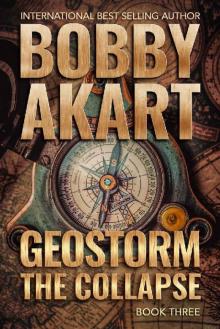 Geostorm The Collapse: A Post Apocalyptic EMP Survival Thriller (The Geostorm Series Book 3)
Geostorm The Collapse: A Post Apocalyptic EMP Survival Thriller (The Geostorm Series Book 3)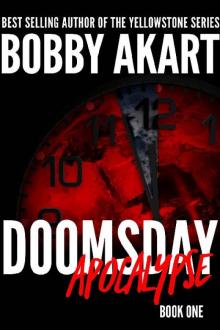 Doomsday Apocalypse
Doomsday Apocalypse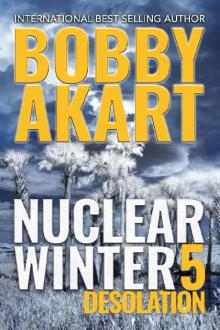 Nuclear Winter Desolation: Post Apocalyptic Survival Thriller (Nuclear Winter Series Book 5)
Nuclear Winter Desolation: Post Apocalyptic Survival Thriller (Nuclear Winter Series Book 5)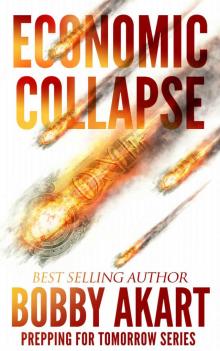 Economic Collapse (Prepping for Tomorrow Book 2)
Economic Collapse (Prepping for Tomorrow Book 2)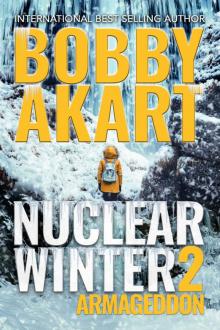 Nuclear Winter Armageddon
Nuclear Winter Armageddon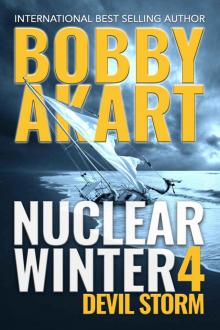 Nuclear Winter Devil Storm
Nuclear Winter Devil Storm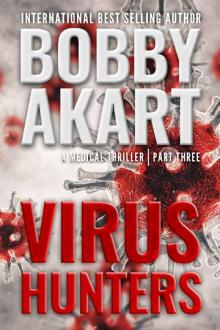 Virus Hunters 3: A Medical Thriller
Virus Hunters 3: A Medical Thriller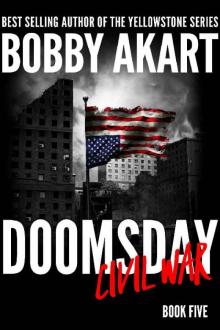 Doomsday Civil War: A Post-Apocalyptic Survival Thriller (The Doomsday Series Book 5)
Doomsday Civil War: A Post-Apocalyptic Survival Thriller (The Doomsday Series Book 5)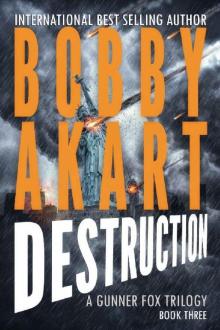 Asteroid Destruction
Asteroid Destruction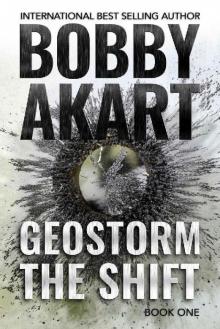 Geostorm the Shift
Geostorm the Shift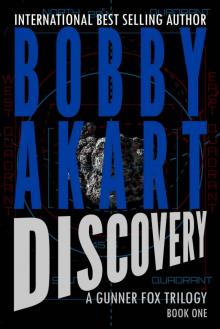 Asteroid Discovery
Asteroid Discovery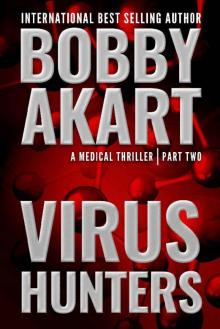 Virus Hunters 2: A Medical Thriller
Virus Hunters 2: A Medical Thriller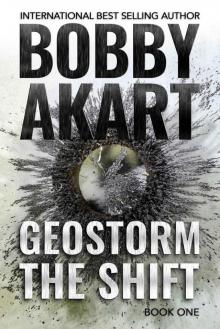 Geostorm The Shift: A Post-Apocalyptic EMP Survival Thriller (The Geostorm Series Book 1)
Geostorm The Shift: A Post-Apocalyptic EMP Survival Thriller (The Geostorm Series Book 1)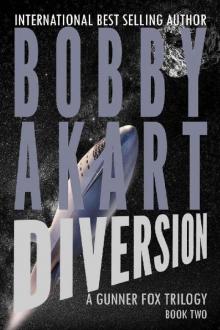 Asteroid Diversion
Asteroid Diversion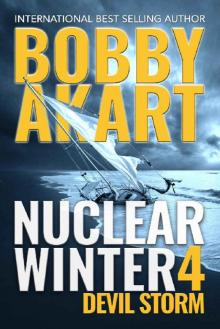 Nuclear Winter Devil Storm: Post Apocalyptic Survival Thriller (Nuclear Winter Series Book 4)
Nuclear Winter Devil Storm: Post Apocalyptic Survival Thriller (Nuclear Winter Series Book 4)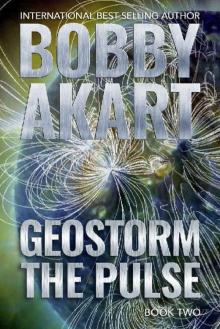 Geostorm The Pulse: A Post Apocalyptic EMP Survival Thriller (The Geostorm Series Book 2)
Geostorm The Pulse: A Post Apocalyptic EMP Survival Thriller (The Geostorm Series Book 2)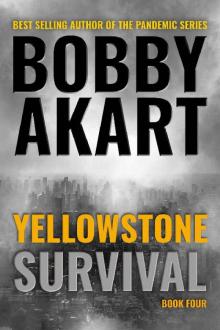 Yellowstone: Survival: A Post-Apocalyptic Survival Thriller (The Yellowstone Series Book 4)
Yellowstone: Survival: A Post-Apocalyptic Survival Thriller (The Yellowstone Series Book 4)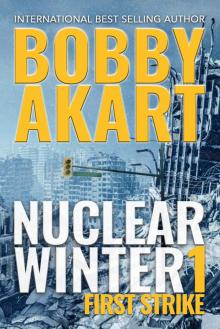 Nuclear Winter First Strike: Post-Apocalyptic Survival Thriller
Nuclear Winter First Strike: Post-Apocalyptic Survival Thriller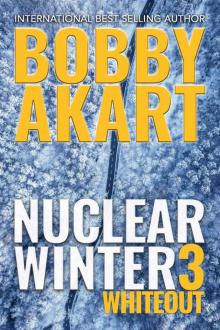 Nuclear Winter Whiteout
Nuclear Winter Whiteout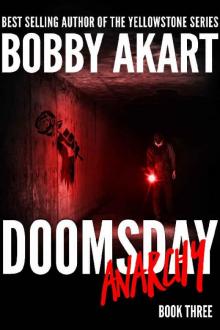 Doomsday Anarchy
Doomsday Anarchy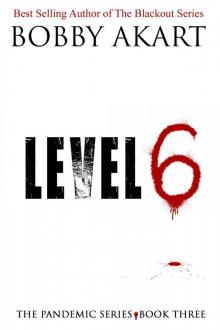 Pandemic: Level 6: A Post Apocalyptic Medical Thriller Fiction Series (The Pandemic Series Book 3)
Pandemic: Level 6: A Post Apocalyptic Medical Thriller Fiction Series (The Pandemic Series Book 3) Martial Law
Martial Law Odessa Reborn: A Terrorism Thriller (Gunner Fox Book 4)
Odessa Reborn: A Terrorism Thriller (Gunner Fox Book 4)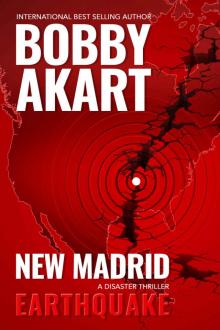 New Madrid Earthquake
New Madrid Earthquake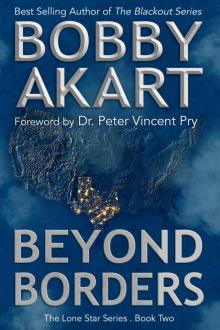 Beyond Borders: Post Apocalyptic EMP Survival Fiction (The Lone Star Series Book 2)
Beyond Borders: Post Apocalyptic EMP Survival Fiction (The Lone Star Series Book 2)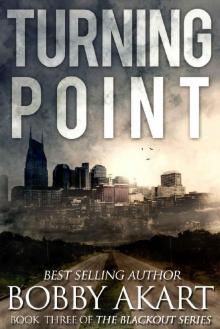 The Blackout Series (Book 3): Turning Point
The Blackout Series (Book 3): Turning Point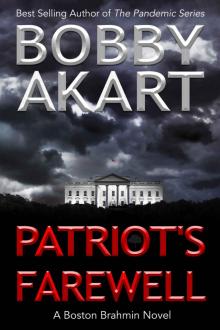 Patriot's Farewell: A Political Thriller Fiction Series (Boston Brahmin Political Thrillers Book 7)
Patriot's Farewell: A Political Thriller Fiction Series (Boston Brahmin Political Thrillers Book 7)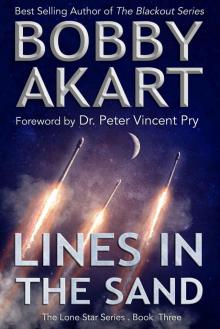 Lines in the Sand_Post Apocalyptic EMP Survival Fiction
Lines in the Sand_Post Apocalyptic EMP Survival Fiction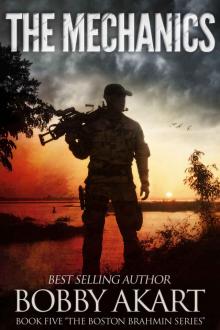 The Mechanics: A Post-Apocalyptic Fiction Series
The Mechanics: A Post-Apocalyptic Fiction Series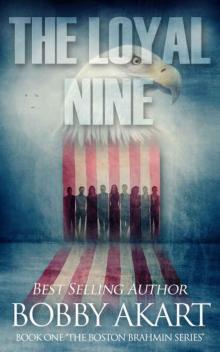 The Loyal Nine
The Loyal Nine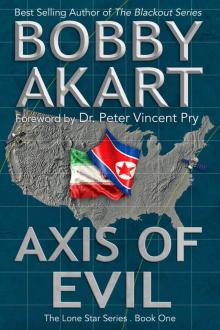 Axis of Evil
Axis of Evil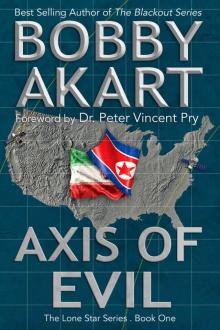 Axis of Evil: Post Apocalyptic EMP Survival Fiction (The Lone Star Series Book 1)
Axis of Evil: Post Apocalyptic EMP Survival Fiction (The Lone Star Series Book 1)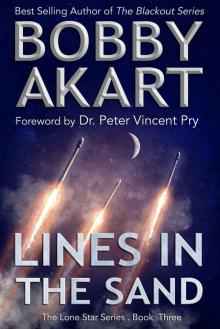 Lines in the Sand: Post Apocalyptic EMP Survival Fiction (The Lone Star Series Book 3)
Lines in the Sand: Post Apocalyptic EMP Survival Fiction (The Lone Star Series Book 3)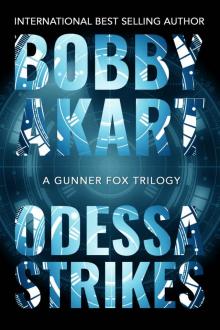 Odessa Strikes
Odessa Strikes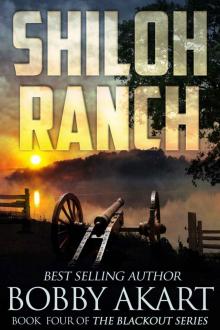 The Blackout Series (Book 4): Shiloh Ranch
The Blackout Series (Book 4): Shiloh Ranch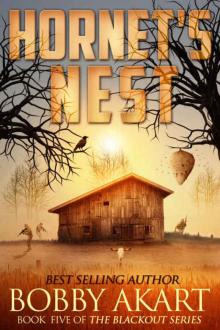 Hornet's Nest: A Post Apocalyptic EMP Survival Fiction Series (The Blackout Series Book 5)
Hornet's Nest: A Post Apocalyptic EMP Survival Fiction Series (The Blackout Series Book 5)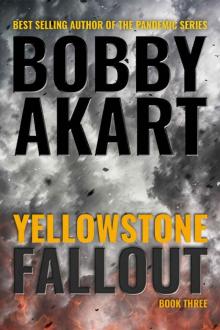 Yellowstone: Fallout: A Post-Apocalyptic Survival Thriller (The Yellowstone Series Book 3)
Yellowstone: Fallout: A Post-Apocalyptic Survival Thriller (The Yellowstone Series Book 3)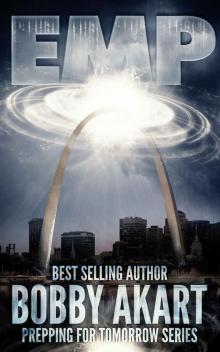 Electromagnetic Pulse
Electromagnetic Pulse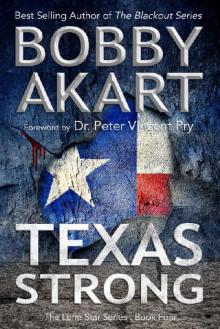 Texas Strong: Post Apocalyptic EMP Survival Fiction (The Lone Star Series Book 4)
Texas Strong: Post Apocalyptic EMP Survival Fiction (The Lone Star Series Book 4)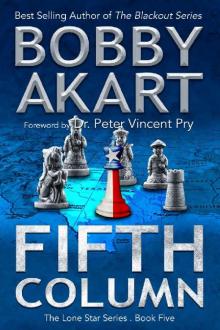 Fifth Column_Post Apocalyptic EMP Survival Fiction
Fifth Column_Post Apocalyptic EMP Survival Fiction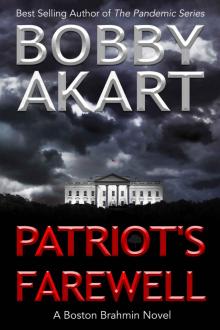 Patriot's Farewell
Patriot's Farewell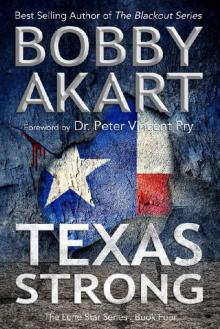 Texas Strong_Post Apocalyptic EMP Survival Fiction
Texas Strong_Post Apocalyptic EMP Survival Fiction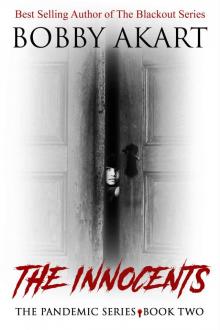 Pandemic: The Innocents: A Post-Apocalyptic Medical Thriller Fiction Series (The Pandemic Series Book 2)
Pandemic: The Innocents: A Post-Apocalyptic Medical Thriller Fiction Series (The Pandemic Series Book 2)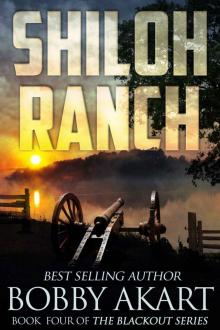 Shiloh Ranch: A Post Apocalyptic EMP Survival Fiction Series (The Blackout Series Book 4)
Shiloh Ranch: A Post Apocalyptic EMP Survival Fiction Series (The Blackout Series Book 4)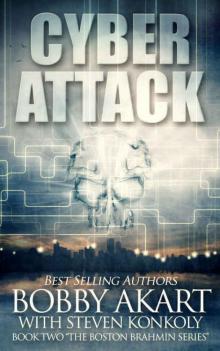 Cyber Attack
Cyber Attack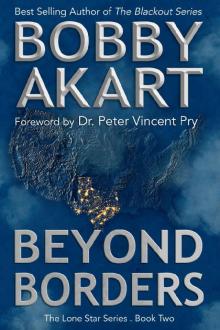 Beyond Borders
Beyond Borders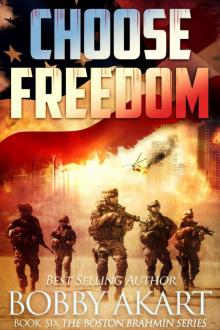 Choose Freedom: A Post-Apocalyptic Fiction Series (The Boston Brahmin Book 6)
Choose Freedom: A Post-Apocalyptic Fiction Series (The Boston Brahmin Book 6)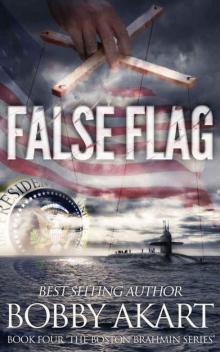 False Flag
False Flag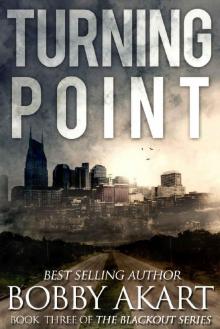 Turning Point: A Post Apocalyptic EMP Survival Fiction Series (The Blackout Series Book 3)
Turning Point: A Post Apocalyptic EMP Survival Fiction Series (The Blackout Series Book 3)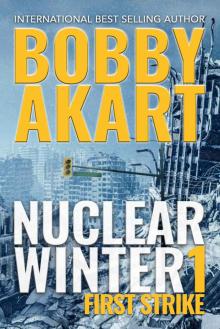 Nuclear Winter First Strike
Nuclear Winter First Strike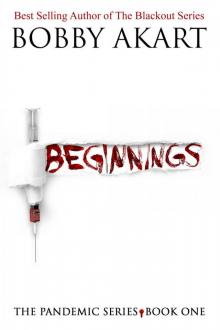 Pandemic: Beginnings: A Post-Apocalyptic Medical Thriller Fiction Series (The Pandemic Series Book 1)
Pandemic: Beginnings: A Post-Apocalyptic Medical Thriller Fiction Series (The Pandemic Series Book 1)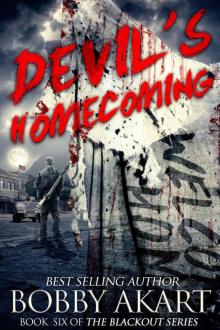 Devil's Homecoming: A Post Apocalyptic EMP Survival Fiction Series (The Blackout Series Book 6)
Devil's Homecoming: A Post Apocalyptic EMP Survival Fiction Series (The Blackout Series Book 6)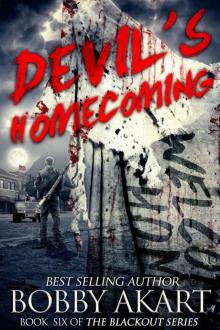 The Blackout Series (Book 6): Devil's Homecoming
The Blackout Series (Book 6): Devil's Homecoming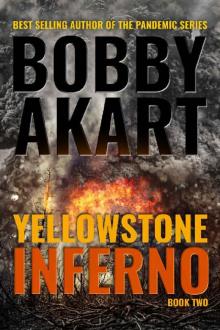 Yellowstone: Inferno: A Post-Apocalyptic Survival Thriller (The Yellowstone Series Book 2)
Yellowstone: Inferno: A Post-Apocalyptic Survival Thriller (The Yellowstone Series Book 2)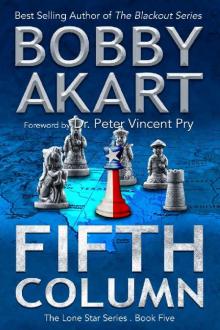 Fifth Column: Post Apocalyptic EMP Survival Fiction (The Lone Star Series Book 5)
Fifth Column: Post Apocalyptic EMP Survival Fiction (The Lone Star Series Book 5)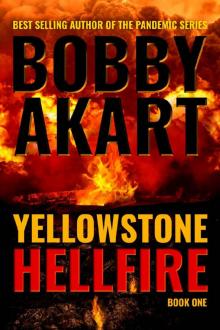 Yellowstone: Hellfire: A Post-Apocalyptic Survival Thriller (The Yellowstone Series Book 1)
Yellowstone: Hellfire: A Post-Apocalyptic Survival Thriller (The Yellowstone Series Book 1)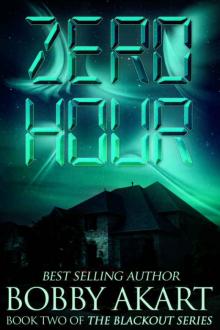 The Blackout Series (Book 2): Zero Hour
The Blackout Series (Book 2): Zero Hour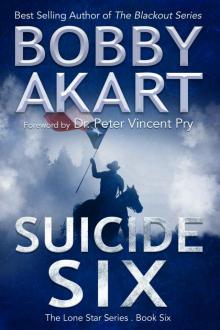 Suicide Six: Post Apocalyptic EMP Survival Fiction (The Lone Star Series Book 6)
Suicide Six: Post Apocalyptic EMP Survival Fiction (The Lone Star Series Book 6)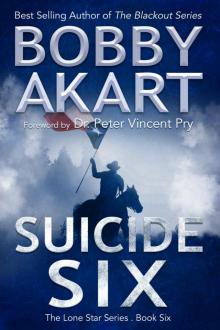 Suicide Six_Post Apocalyptic EMP Survival Fiction
Suicide Six_Post Apocalyptic EMP Survival Fiction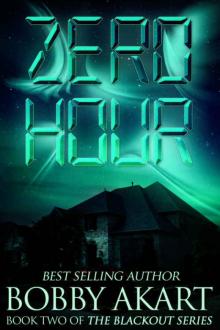 Zero Hour: A Post-Apocalyptic EMP Survival Fiction Series (The Blackout Series Book 2)
Zero Hour: A Post-Apocalyptic EMP Survival Fiction Series (The Blackout Series Book 2)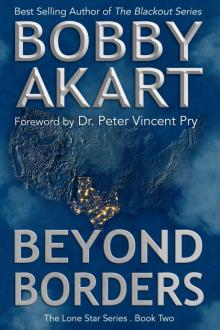 Beyond Borders_Post Apocalyptic EMP Survival Fiction
Beyond Borders_Post Apocalyptic EMP Survival Fiction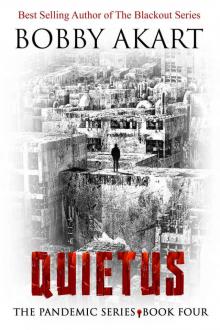 Pandemic: Quietus: A Post-Apocalyptic Dystopian Fiction Series (The Pandemic Series Book 4)
Pandemic: Quietus: A Post-Apocalyptic Dystopian Fiction Series (The Pandemic Series Book 4)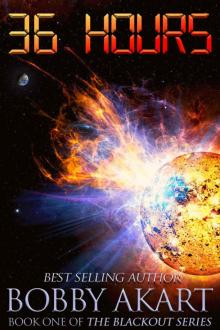 36 Hours: A Post-Apocalyptic EMP Survival Fiction Series
36 Hours: A Post-Apocalyptic EMP Survival Fiction Series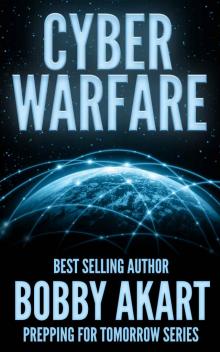 Cyber Warfare
Cyber Warfare